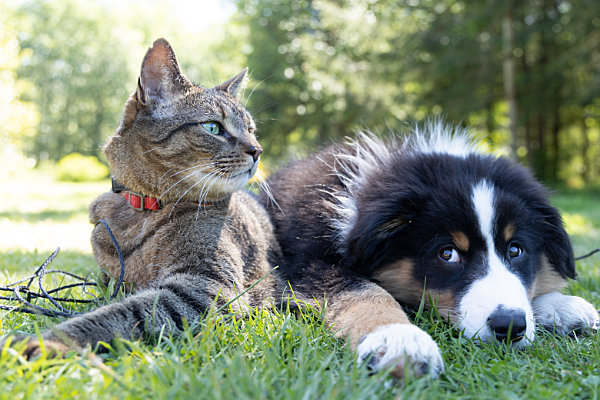
Photo: StockSnap/Pixabay
Outer Banks welcomes pups to play on the sand and in the waves. Dogs must be leashed, and leashes should not be longer than 10 feet.
by Kim Salerno
TripsWithPets
Wake Forest, NC - Most pets love the beach as much as their pet parents do.
Fortunately, if you’re looking for a beach vacay you and your furry kid will both enjoy, there are plenty of pet-friendly options to choose from.
We’ve compiled a list of ten of our favorites - in no particular order, along with the reasons we love these beaches, and a few of the best local pet-friendly accommodations. All of the accommodations are either oceanfront or a short walk to the beach, and we included a range of prices and types. Choose your favorite, and head out for some surf, sand, and sun!
Atlantic Beach, NC
This cozy beach, located in scenic coastal North Carolina, is an ideal spot to bring your pooch for some fun in the sun. Dogs are welcome to come and play year round on the main strand. However, they’re not allowed to venture further than 20 feet from the shore in lifeguard-protected areas. Besides the beach, there are pet-friendly breweries, restaurants, and attractions, such as the Fort Macon State Park, a Civil War memorial that features nature trails, guided tours, and its own beach area.
Places to stay
Atlantis Lodge
This resort is one of our favorite pet-friendly places to stay. Atlantis welcomes dogs and cats are welcome at this beachfront establishment. Upon check-in, dogs are greeted with local gourmet treats. On the beach, pets are provided with their own lounge chairs and umbrellas, and also have their own pet wash station. A bonus pet amenity is an on-site dog park!
There is a per-night pet fee and a limit of two pets per room, but there are no weight or breed restrictions.
Doubletree by Hilton Atlantic Beach
This beachfront Doubletree hotel offers amazing views and plenty of beach area to explore with your pet. They also have a beachside bar and grill for beachfront dining with your furkid. Waterfront rooms with balconies allow you and your pet to chillax while taking in the seabreeze, sounds of the waves, and breathtaking ocean views
The hotel charges a per-stay pet fee. Up to two pets are allowed per room, and there is a 50 pound weight limit.
Find more pet-friendly places to stay in Atlantic Beach, NC.
South Padre Island, TX
If you’re looking for a pet-friendly beach, you can’t do better than South Padre Island in Texas. The entire Padre Island National Seashore welcomes pets at nearly every beach and park, both onshore and in the water, as long as they are leashed. The area also features pet-friendly shops, events, and even boat rides.
Places to stay
La Quinta by Wyndham South Padre Island Beach
Nestled on the Gulf of Mexico, La Quinta’s beachfront South Padre Island location features free breakfast, an in-room kitchen so you can comfortably prepare your own meals, and room service in case you’d rather just relax. Either way, you can dine in with your pet, and enjoy a hotel-provided movie or show together afterwards.
Dogs and cats are welcome, with no breed restrictions. The hotel does have a weight restriction of 75 pounds, and charges a per-night pet fee.
Hilton Garden Inn South Padre Island
The beachfront Hilton Garden Inn South Padre Island is just 492 feet from the Gulf of Mexico, so you and your pet can easily step out to the beach to enjoy the surf. The hotel offers 24-hour front desk service, so if you need something, you don’t have to leave your hotel room. Rooms feature balconies with full or partial ocean views, which you and your pooch can enjoy together as you relax with a cup of coffee or tea.
Both dogs and cats are welcome here. There are no breed restrictions, but there is a 75 pound weight limit, and the hotel requires a per-stay pet fee.
Find more pet-friendly places to stay in South Padre Island.
Portland, ME
Portland, Maine is not the first place you’d think of for a beach getaway, but the Portland area actually has a wealth of beautiful beaches, and many if not most are pet friendly. Each beach offers a bit of a different experience. Peaks Island is a quaint and charming spot that’s slow-paced, quiet, and ideal for enjoying the scenery. Higgins beach is perfect for beach combing or kayaking. If you enjoy history, head to Cape Elizabeth Beach, where you can tour a variety of lighthouses and experience New England charm. Willard Beach is a small sand-and-pebble beach where you can go for a swim and watch the lobster boats as they go out and come in. East End Beach is a popular spot located in the heart of the city. Portland is a pet-friendly destination, and dogs are very welcome on beaches, but they must be on leashes at certain times of the year.
Places to stay
Westin Portland Harborview
Tucked into the charming Portland city center arts and shopping district, the beautiful and historic Westin Portland Harborview offers access to dining, shops, and the harbor. Plush Marriott bedding will keep you and your pooch comfortable, while spacious windows offer a stunning city view you will both enjoy.
Pets 50 pounds and under are welcome, and up to 2 pets are allowed.
Aloft Portland Maine
Situated within walking distance (or a short drive) from some of Portland’s best attractions, Aloft Portland Maine offers an array of great amenities pet parents will love, including a concierge service, room service, a restaurant, and a pet welcome package upon arrival - which includes Aloft-branded bed and bowl + complimentary treats and toys. The icing on the cake is that they are only a short walk to Portland's East End Beach.
The hotel has a limit of two pets, a weight limit of 50 pounds, and a per-stay pet fee.
Find more pet-friendly places to stay in Portland, ME.
Nags Head, NC
This gem of a beach locale, located in North Carolina’s scenic and pristine Outer Banks, welcomes pups to play on the sand and in the waves. Dogs must be leashed, and leashes should not be longer than 10 feet. You and your pooch can also explore the Outer Banks National Scenic Byway, and the nearby Wright Brothers Memorial together.
Places to stay
Sun Realty Vacation Rentals
If you’re looking for a place to hang your hat in Nags Head, Sun Realty Vacation Rentals has what you need. Choose from a variety of charming, picturesque oceanfront beach homes, some of which are just minutes from dog-friendly beaches.
Pet-friendly properties allow up to two well-trained dogs, and sometimes allow cats as well. A pet deposit is required for professional flea control. Pets are not allowed in property hot tubs or pools.
Stan White Vacation Rentals
Stan White Vacation Rentals boasts 80 pet-friendly vacation homes in Nags Head and the surrounding area. Rental options range from cozy one-bedroom accommodations to 10-bedroom villas, and offer everything from simple pleasures, to full amenities, to luxury stays. Pet-friendly amenities include fenced-in yards and easy access to pet-friendly beaches and hiking trails.
Properties allow up to two adult, well-trained dogs. Some properties may have breed or weight restrictions. A per-stay pet fee is required.
Find more pet-friendly places to stay in Nags Head.
Find more pet-friendly places to stay in Nags Head.
Hollywood, FL
Want to head to a beach that’s beautiful, tropical, and warm all year, without ever leaving the country? Dog Beach of Hollywood is the perfect Florida getaway for you and your pet. Dogs are welcome on the beach as long as they are leashed. You can also visit the Yellow Green Farmer’s Market, the Topeekeegee Yugnee Park, or one of several Hollywood dog parks.
Places to stay
Costa Hollywood Beach Resort
This Florida resort is condo-style luxury hotel that offers you your own seaside retreat. Just a short walk from Hollywood Beach and the Hollywood Beach Boardwalk, the hotel offers a kitchenette in every room for easy in-room dining, a private beach with two chairs and towels provided so you and your pup can relax on the sand or play in the waves, and 24/7 concierge service so you can find all of the pet-friendly activities in the area.
Up to two pets, dogs or cats, are allowed, with a pet weight limit of 75 pounds. There is a per-stay pet fee, and pets are not allowed in the room unattended.
Hollywood Beach Suites and Hotel
This popular pet-friendly hotel is an affordable option that offers a lot of bang for your buck. Located just a minute or two from Hollywood Beach and the Boardwalk, the vibrant, beachy decor is quintessential Florida, while the mini-kitchen and comfy beds will make you and your furkid feel right at home. There’s even a designated potty area for pet guests.
Bring up to two pets, dogs or cats, as long as they are 25 pounds or less. There is a per-visit pet fee. Pets are allowed to stay in the rooms unsupervised, and the hotel provides a designated potty area.
Find more pet-friendly places to stay in Hollywood, FL.
Jekyll Island, GA
There are several different beaches on Georgia’s Jekyll Island, and each has something a little different to offer you and your pooch. You can also explore the island on a pet-friendly hiking trail, or even take a dog-friendly dolphin tour! Dogs are allowed on most beaches, however, pets are restricted from a specific area designated for the protection of sea turtles and migratory birds. Pets must be under their parents’ direct control, and pet parents must dispose of their pet’s waste.
Places to stay
Hampton Inn Jekyll Island
Who doesn't love Hampton? This Jekyll Island Hampton Inn features a boardwalk that leads straight to the beach for easy enjoyment of sand and sun, free breakfast, so you can dine in with your pet in the morning, and a balcony/terrace so you can enjoy the scenic hotel views together. The hotel even offers canoeing, so you can paddle out with your pup!
Two pets are allowed per room. Cats and dogs are welcome, and there is no breed restriction. There is a weight restriction of 75 pounds, and the hotel does charge a per-stay pet fee.
Holiday Inn Resort Jekyll Island
Rooms at the Jekyll Island Holiday Inn boast a stunning ocean view, which you can enjoy with your pet on the balcony or terrace. The hotel offers easy access to nearby hiking trails, so you can explore the island together, and convenient food delivery, so you can share meals together in your room.
Dogs and cats are welcome, with no weight restrictions The hotel does provide a designated pet potty area, and pets are allowed in rooms unattended. A per-night pet fee is required.
Find more pet-friendly places to stay in Jekyll Island, GA.
Key West, FL
Famed for its laid-back vibe, its vintage Florida charm, and its position as the southernmost point in the United States - and the only place in the U.S. that boasts colorful sunrises and sunsets, Key West is also a paradise for pooches. Leashed dogs are welcome on the island’s beaches, and some beaches will allow unleashed dogs as long as they’re under voice control. The most popular off-leash beach is notably named “Dog Beach.”
Places to stay
Havana Cabana
Visit this Caban-inspired paradise with your pet and you won't be disappointed. This waterfront pet-friendly resort is a short jaunt to three awesome dog-friendly beaches. While at the Havana Cabana, pets are welcome to dine with you in their outdoor restaurant. In addition, pets are welcome in the tiki hut, resort shuttle, game areas and pool area (as long as they stay out of the pool). Upon check-in, pets are greeted with a Sandy Paws Doggie Bag - complete with dog biscuits, poop bags, water bowl, and mat.
The hotel welcomes both dogs and cats, with no breed restriction. There is a 50 pound weight limit, and a required per-stay pet fee. Up to two pets are allowed.
Reach Key West Curio Collection
This popular pet-friendly resort is a breezy, yet luxurious way to enjoy your stay in Key West. This beachfront hotel features private balconies so you and your pet can take in the sunrise–or sunset. Explore Reach Key West Curio's extensive private beach together, or head out into the waves together for an onsite canoe ride.
The hotel only allows dogs, and only up to 25 pounds. There is a per-night pet fee.
Find more pet-friendly places to stay in Key West, FL.
Huntington Beach, CA
Huntington Beach is known as one of the country’s most pet-friendly beaches, and for good reason. There are off-leash beaches to explore, a giant dog park in the center of town to play in, dog-themed events to attend, and even doggie surfing lessons available so he can learn how to hang ten. When he’s had enough lessons, he can participate in the yearly dog surfing competition!
Places to stay
Kimpton Shorebreak Huntington Beach Resort
Kimpton is one of our favorite pet-friendly hotel chains, and Kimpton Shorebreak does not disappoint. This oceanfront hotel provides loaned plush pet beds, food bowls, water bowls, and a concierge list of local pet-friendly restaurants, shops, and activities. The hotel also offers food delivery and laundry services, so you can stay in and relax with your pooch.
There are no pet restrictions–if your pet fits through the door, it’s welcome. There are no pet fees, and there is no limit on how many pets you can bring.
The Waterfront Beach Resort A Hilton Hotel
Located just a short walk away from Huntington Dog Beach, the Waterfront Beach Resort is awash in pet-friendly amenities. Pet guests are given a welcome package with treats, a pet bed, waste bags, and a pet-friendly information packet. Leashed pets are allowed in all public areas of the hotel, even poolside (just not inside the pool), and one onsite restaurant boasts a doggie menu.
Pets are more than welcome; there is a per-pet, per-day fee and a 75 pound weight limit.
Find more pet-friendly places to stay in Huntington Beach, CA.
Seaside, OR
This Oregon destination guarantees a fun-filled beach getaway for people and pooches alike. Seaside welcomes dogs to play in the sand and surf - unleashed! In addition to pet-friendly beaches, you can walk along the Prom with your furkid, or hike with them along Tillamook Head. Pet parents must remain attentive to their pets, clean up after them, and practice discernment as to when and whether to have them off-leash.
Places to stay
Coast River Inn by OYO Seaside
Located along the Necanicum River, just a short walk from the Seaside Carousel Mall, Coast River Inn offers rooms with kitchenettes, making dining in with your pet easy and convenient Many rooms also have a river view, which you can enjoy together on a balcony or terrace.
Up to two pets–dogs or cats–are welcome, with no weight restrictions, and pets may be left unattended in rooms. A per-night pet fee is required.
Kathryn Riverfront Inn Ascend Hotel Collection
Situated at the end of the Lewis and Clark National Historic Trail, on the banks of the Necanicum River, The Kathryn Riverfront Inn is an Oregon treasure. There’s easy access to charming shops and restaurants right in the heart of downtown Seaside. In addition, the beach is within walking distance, so whether you and your pet are up for people-watching, shopping, or strolling on the beach together, you can do it all easily from Kathryn Riverfront.
One dog up to 50 pounds is welcome to stay with you.There is a per-night pet fee.
Find more pet-friendly places to stay in Seaside, OR.
Hilton Head Island, SC
Hilton Head Beach is the perfect place for you and your pet to run and play...or relax and do nothing at all. The spectacular Lowcountry beaches are warm and inviting year round, and they welcome four-legged visitors. The island has its own double-gated dog park where your furry kid can safely play.
Places to stay
Beach Properties of Hilton Head
Beach Properties offers select properties for vacationers looking to stay a while with their pets. Their properties are clean, beautiful, and full of beachside charm, and they are very pet-friendly. Pet-friendly walking trails, restaurants, and activities can be easily accessed from each property.
Dogs are welcome and there is a non-refundable pet deposit.
Best Western Ocean Breeze Inn
This Best Western is an economical way to enjoy your stay at Hilton Head beach. Given that it's not directly on the beach, the rates are very budget friendly. However, the beach is only a quick 7 minute walk away! Plus, Enjoy a free full breakfast - that you can take back to your room and enjoy your pet if you like. In the afternoon you and your pup can kickback and enjoy barbequing at one of the hotels' outdoor grilling stations.
Up to two pets are welcome. Pet weight limit is 55 pounds. There is a per-night pet fee.
Find more pet-friendly places to stay in Hilton Head Island, SC.
There are a number of other pet-friendly beach getaway options. Head out to one of these or pick another destination. Just get out there and enjoy the surf, sand and ocean breeze with your doggo by your side.
Kim Salerno is CEO/Founder for TripsWithPets, Inc. TripsWithPets is a leader in the pet travel industry – providing online reservations at pet-friendly hotels across the United States and Canada.















 2. Socialization Adventures (20%)
2. Socialization Adventures (20%) Whether it's trying out new activities together, creating a cozy corner at home, or simply enjoying some quiet cuddles, pet parents are making a conscious effort to strengthen their connection with their pets.
5. Mental Stimulation and Enrichment (9%)
Whether it's trying out new activities together, creating a cozy corner at home, or simply enjoying some quiet cuddles, pet parents are making a conscious effort to strengthen their connection with their pets.
5. Mental Stimulation and Enrichment (9%)





